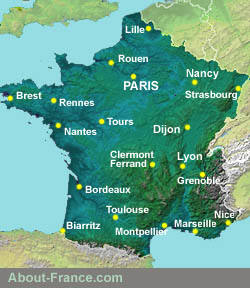- Explore France ►
- Essential pages
- Travel in France
- Where to go
- What to see and do
About-France.com
- the connoisseur's guide to France
French auxiliary verbs: 2. être
Auxiliaries are functional
verbs that are added to other verbs in order to form particular tenses.
2. Etre
Etre
- to be -
is a verb with three
functions. It is the most common, and also the most irregular, of
French verbs.
►Firstly it is a lexical verb, or main verb, in its own right, meaning "to be"
►Secondly it is an auxiliary which combines with the past participle of a dozen or so French verbs to form composite tenses such as the perfect or the past perfect: aller, venir, monter, descendre, entrer, sortir, arriver, partir, rester, tomber, naêtre, mourir (and devenir, rentrer, remonter, repartir etc.) except when these verbs are used transitively; and also with reflexive verbs.
►Thirdly it is the auxiliary used to form passive tenses in French. For each active tense of a verb, the passive is formed with the appropriate tense of être followed by the past participle: thus, for example,
►Firstly it is a lexical verb, or main verb, in its own right, meaning "to be"
Example:
Il est trois heures moins
le quart - It is a quarter to three
►Secondly it is an auxiliary which combines with the past participle of a dozen or so French verbs to form composite tenses such as the perfect or the past perfect: aller, venir, monter, descendre, entrer, sortir, arriver, partir, rester, tomber, naêtre, mourir (and devenir, rentrer, remonter, repartir etc.) except when these verbs are used transitively; and also with reflexive verbs.
Examples:
Je suis allé en France l'année dernière- I went to France last year.
Les marchés se sont effondrés - The markets have collapsed.
Les promeneurs étaient arrivés au sommet - The walkers had reached the summit.
Je suis allé en France l'année dernière- I went to France last year.
Les marchés se sont effondrés - The markets have collapsed.
Les promeneurs étaient arrivés au sommet - The walkers had reached the summit.
►Thirdly it is the auxiliary used to form passive tenses in French. For each active tense of a verb, the passive is formed with the appropriate tense of être followed by the past participle: thus, for example,
►
The present
passive is formed with the present tense of être and
a past participle.
Example: Il est cassé - It's broken
► The perfect passive (passé composé passif) is formed with the perfect tense of être and a past participle.
Example: Ma chambre a été repeinte* - My bedroom has been repainted
► The future passive (futur passif) is formed with the future tense of être and a past participle.
Example: Le contrat sera renouvelé pour un an - The contract will be renewed for a year
► The past conditional passive (passé conditionnel passif) is formed with the past conditional tense of être and a past participle.
Example: Elle aurait été déçue* - She would have been disappointed
* See Past tenses for the rules on agreement of the past participle
Example: Il est cassé - It's broken
► The perfect passive (passé composé passif) is formed with the perfect tense of être and a past participle.
Example: Ma chambre a été repeinte* - My bedroom has been repainted
► The future passive (futur passif) is formed with the future tense of être and a past participle.
Example: Le contrat sera renouvelé pour un an - The contract will be renewed for a year
► The past conditional passive (passé conditionnel passif) is formed with the past conditional tense of être and a past participle.
Example: Elle aurait été déçue* - She would have been disappointed
* See Past tenses for the rules on agreement of the past participle
Verb tables: Etre
Note: For each tense, a sample English equivalent is given for the first person singular. This represents the most common translation of the tense in question, but not the only possibility.Table 1.
| Person | Present (I am) |
Future (I will be) |
Imperfect (I was / was being) |
|---|---|---|---|
| 1st Singular. | je suis | je serai | j'étais |
| 2nd Singular | tu es | tu seras | tu étais |
| 3rd Singular | il / elle / on ... est | il (..) sera | il (..) était |
| 1st plural | nous sommes | nous serons | nous étions |
| 2nd plural | vous êtes | vous serez | vous étiez |
| 3rd plural | ils / elles sont | ils seront | ils étaient |
Table 2
| Person | Preterite (I was) |
Perfect (passé
composé) (I have been) |
Pluperfect (I'd been) |
|---|---|---|---|
| 1st Singular. | je fus | j'ai été | j'avais été |
| 2nd Singular | tu fus | tu as été | tu avais été |
| 3rd Singular | il (..) fut | il (..) a été | il avait été |
| 1st plural | nous fûmes | nous avons été | nous avions été |
| 2nd plural | vous fûtes | vous avez été | vous aviez été |
| 3rd plural | ils furent | ils ont été | ils avaient été |
Table 3
| Tenses (indicative): | |||
| Person | Future
perfect (I will have been) |
Conditional (I would be) |
Past
conditional (I would have been) |
| 1st Singular. | j'aurai été | je serais | j'aurais été |
| 2nd Singular | tu auras été | tu serais | tu aurais été |
| 3rd Singular | il aura été | il serait | il aurait été |
| 1st plural | nous aurons été | nous serions | nous aurions été |
| 2nd plural | vous aurez été | vous seriez | vous auriez été |
| 3rd plural | ils auront été | ils seraient | ils auraient été |
Table 4
| Imperative | |||
| Person | (be) |
Present participle | |
| 2nd Singular | sois | . | étant |
| 1st plural | soyons | . | . |
| 2nd plural | soyez | . | . |
Table 5
| Tenses (subjunctive) : | |||
| Person | Present (may be) |
preterite (might be) |
Perfect
(parfait) (may have been) |
| 1st Singular. | sois | fusse | aie été |
| 2nd Singular | sois | fusses | aies été |
| 3rd Singular | soit | fût | ait été |
| 1st plural | soyons | fussions | ayons été |
| 2nd plural | soyez | fussiez | ayez été |
| 3rd plural | soient | fussent | aient été |
Further subjunctive cases - such as a pluperfect subjunctive - can theoretically be formed, though to all intents and purposes these are never used in modern French.
Examples:
Paris is the capital of France.
Paris is the capital of France.
-
Paris est
la capitale de la France
Tomorrow we'll be in Bordeaux. Demain
nous serons à Bordeaux.
The
president was surrounded by his guards Le président
était
entouré de ses gardes
The film has been very badly received by the
critics. Le
film a été très mal
reçu par les critiques.
He will have been surprised by the result. Il
aura été surpris par le
résultat..
It's possible that this is (may be) the book
we're looking for. Il
se peut que ce soit
le livre que nous cherchons.
Please be reassured. Soyez
rassurés s'il vous plaît !.
► Continue to the auxiliary avoir
About-France.com
Online French Grammar
: Copyright
© About-France.com 2007 - 2023
Return to About-France home page Full site index Contact
Return to About-France home page Full site index Contact
Essential
French words
and phrases for travellers 25 essential words and
25 vital phrases




